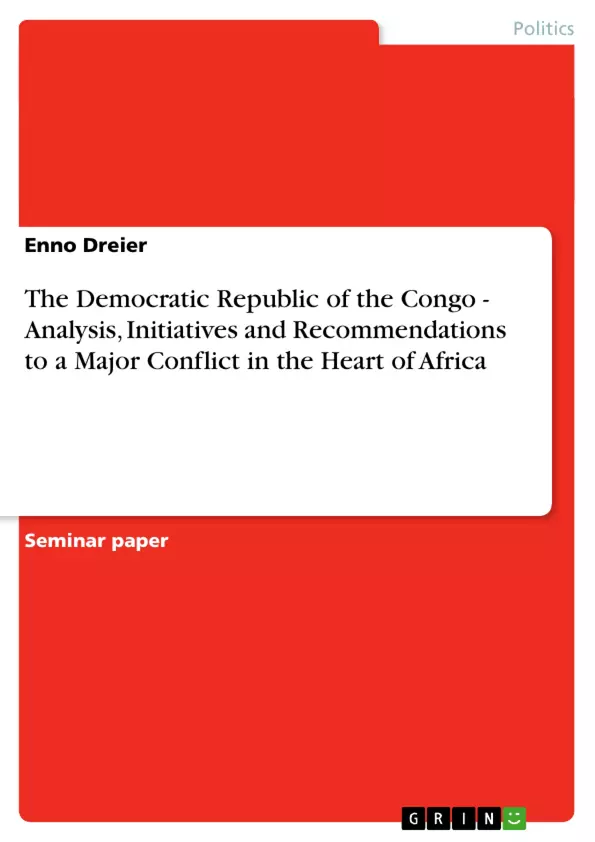To call the conflict in the Democratic Republic of the Congo (DRC) one of the most complex ones in history is no hyperbole. The involvement of up to 20 different parties and the various interests that occur might else be found only in the complexity of the 30 Years’ War of 17 th century Europe. Indeed many parallels exist between these two wars except maybe the fact that the former one can be regarded as war of state-building while the war in the DRC can be regarded as a state-collapsing war (van Crefeld 1999: 223-251). Due to the number of African countries involved, the estimated loss of 2,000,000 lives (Tshiyembé 2003), the complex role of economy, and the mere size of the country, it seems sad but true that ‘peace on the African continent cannot become a reality until there is peace in the DRC’ (Guéhenno 2002: 78).
When considering such a conflict it is crucial to analyze the root causes of the conflict, even if they lie in the past, because these are necessary for understanding and addressing the conflict. Therefore a large part of this report will deal with historic, economic and systemic analysis.
Inhaltsverzeichnis (Table of Contents)
- A Introduction.
- B Root Causes of the Conflict..
- 1. Colonial Heritage ..
- 2. Mobutu's Kleptocracy..
- 3. Import of the Rwanda-Uganda conflict..
- 4. The Kabila Era
- 5. Congo's Wealth..
- 6. The Conflict System.......
- C Undertaken Initiatives to solve the Conflict.
- D Recommendations and Future Prospects ......
- 1. Credible Peace Enforcement..
- 2. International Pressure on Rwanda and Uganda..
- 3. Stronger Control of Economic Involvement and cutting off the arms flow...\n
- 4. Negotiations.
- 5. Peacekeeping and Democratization.
- 6. International Tribunal on War Crimes in the DRC\n
- 7. Serious and Neutral Journalism……...\n
- E Conclusion
Zielsetzung und Themenschwerpunkte (Objectives and Key Themes)
This report aims to provide a comprehensive analysis of the conflict in the Democratic Republic of Congo (DRC), examining its root causes, undertaken initiatives to resolve the conflict, and proposing recommendations for future action. The report focuses on understanding the complexities of the conflict, highlighting the historical, economic, and systemic factors that have contributed to its prolonged nature.
- Colonial heritage and its lasting impact on ethnic divisions and resource exploitation.
- The role of Mobutu's regime in exacerbating ethnic tensions and fostering a climate of corruption and instability.
- The influence of regional conflicts, particularly the Rwandan genocide, on the DRC's internal dynamics.
- The strategic importance of the DRC's vast natural resources and their role in perpetuating the conflict.
- The need for credible peace enforcement, international pressure on regional actors, and a comprehensive approach to achieving lasting peace and stability.
Zusammenfassung der Kapitel (Chapter Summaries)
The report begins with an introduction that highlights the complexity of the conflict in the DRC, drawing parallels with the 30 Years' War in 17th-century Europe. It emphasizes the importance of understanding the root causes of the conflict, particularly its colonial heritage and the legacy of Mobutu's kleptocracy.
Chapter B delves into the root causes of the conflict, tracing its origins to the colonial era, with a focus on the exploitation of natural resources and the manipulation of ethnic divisions. It examines Mobutu's regime and its role in exacerbating existing tensions, as well as the import of the Rwanda-Uganda conflict into the DRC.
Chapter C examines various initiatives undertaken to resolve the conflict, including peace agreements and international interventions.
Chapter D provides recommendations for achieving lasting peace, emphasizing the need for credible peace enforcement, international pressure on regional actors, and a comprehensive approach to address the underlying causes of the conflict.
Schlüsselwörter (Keywords)
The key terms and focus topics of this report include the Democratic Republic of Congo (DRC), conflict analysis, root causes, colonial heritage, Mobutu's kleptocracy, Rwandan genocide, regional conflicts, natural resources, peace enforcement, international pressure, and peacebuilding initiatives.
Frequently Asked Questions
Why is the conflict in the DRC compared to the 30 Years' War?
The comparison stems from the extreme complexity, the involvement of up to 20 different parties, and the various regional interests, making it one of the most intricate conflicts in history.
What are the historical root causes of the Congo conflict?
The causes include the colonial heritage of resource exploitation, Mobutu's long-standing kleptocracy, and the spillover of the Rwandan genocide and Uganda's internal conflicts.
How do natural resources fuel the war in the DRC?
The DRC's vast wealth in minerals and resources often leads to "state-collapsing" dynamics where different factions fight for control over mining areas to fund their activities.
What are the recommendations for lasting peace?
The report suggests credible peace enforcement, international pressure on Rwanda and Uganda, stronger control of arms flows, and the establishment of an international tribunal for war crimes.
What role does journalism play in the conflict?
The report emphasizes the need for serious and neutral journalism to inform the global community accurately and prevent the manipulation of ethnic tensions.
- Quote paper
- Enno Dreier (Author), 2003, The Democratic Republic of the Congo - Analysis, Initiatives and Recommendations to a Major Conflict in the Heart of Africa, Munich, GRIN Verlag, https://www.grin.com/document/21453



